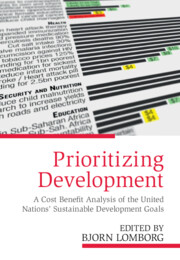 Prioritizing Development
Prioritizing Development Published online by Cambridge University Press: 30 May 2018
Summary
There is clearly an existing problem with development data provision. For example, even population figures may be uncertain because of undercounting of some groups in society, and changes to the statistical basis of GDP estimates can make large differences. Ghana became a middle-income country overnight when its estimated GDP doubled in this way.
Food and Agriculture Organization (FAO) data on undernutrition – on which many poorer countries rely in the absence of official national statistics – has also been shown to be prone to significant errors.
This matters because the post-2015 agenda is likely to have a far greater monitoring burden, and Jerven has shown convincingly that paying for a full set of development data is not feasible. The second issue is that, even if it was available, throwing money at the problem will not solve it. The problem of lack of statistical capacity is hard to solve, and the chapter also points out the opportunity cost. The Partnership in Statistics for Development in the Twenty-First Century (PARIS21) group estimates that there has been an increase in data-gathering exercises in Africa because of the MDGs, but a shift away from surveys not closely geared to them. As Jerven correctly argues, macroeconomic, labor, and agricultural statistics have suffered in particular.
This chapter is a groundbreaking attempt to delineate the issue, map the extent of the problem, and make recommendations; essentially it is a wake-up call to the development community. It makes several important contributions, the most important of which is its careful enumeration of the costs of monitoring theMDG indicators. This quantification is extremely powerful in showing the need for prioritization of targets and indicators – and so is highly complementary to the Copenhagen Consensus exercise.
Because there is not yet a definitive list of targets and indicators, a precise costing is impossible, but the chapter usefully lays out the likely minimumdata requirements. However, the cost of data analysis and utilization is excluded from these estimates, and this is, of course, a necessary requirement for the information to be debated by politicians and the public.
To save this book to your Kindle, first ensure [email protected] is added to your Approved Personal Document E-mail List under your Personal Document Settings on the Manage Your Content and Devices page of your Amazon account. Then enter the ‘name’ part of your Kindle email address below. Find out more about saving to your Kindle.
Note you can select to save to either the @free.kindle.com or @kindle.com variations. ‘@free.kindle.com’ emails are free but can only be saved to your device when it is connected to wi-fi. ‘@kindle.com’ emails can be delivered even when you are not connected to wi-fi, but note that service fees apply.
Find out more about the Kindle Personal Document Service.
To save content items to your account, please confirm that you agree to abide by our usage policies. If this is the first time you use this feature, you will be asked to authorise Cambridge Core to connect with your account. Find out more about saving content to Dropbox.
To save content items to your account, please confirm that you agree to abide by our usage policies. If this is the first time you use this feature, you will be asked to authorise Cambridge Core to connect with your account. Find out more about saving content to Google Drive.